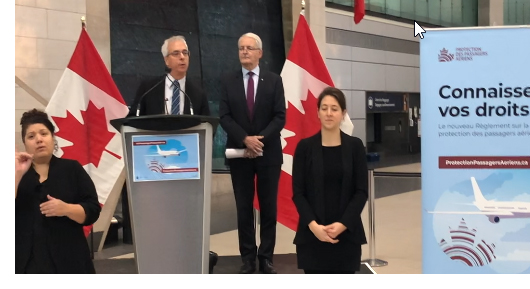Remarks for December 13 press conference re: APPR Phase II

Air travel is an essential part of modern life. Nowhere is that more true than in this vast country. Every year, about 160 million travellers get on or off a plane in Canada. The people passing through this and every Canadian airport rely on flights to see family and friends, explore new places, do business, and seek medical treatment.
Most of the time, flights go as planned. But sometimes, they don't, and that can be very frustrating.
Air passengers should be treated fairly if their flight's late, their plane is stuck on the tarmac, their bag's lost, or they're bumped. Passengers need to be told what they're entitled to – and what's happening when their flight isn't taking off on schedule – and whom they can turn to if they've had air travel issues.
The Air Passenger Protection Regulations, the APPR, help accomplish these goals. In 2018, tens of thousands of Canadians and stakeholders shared their ideas on air passenger protection through public consultation sessions, online questionnaires, airport surveys, and written comments and submissions. In May 2019, we released final regulations.
The first set of APPR requirements took effect on July 15. They cover communications, tarmac delays, lost and damaged bags, denied boarding, and the transportation of musical instruments.
This Sunday, the second set of requirements will kick in. They deal with flight delays, flight cancellations, and the seating of children.
We know delays and cancellations are a particular concern for many Canadians, especially as we head into the busy holiday travel season.
Under the APPR, passengers will be entitled to rebooking if their flight is delayed or cancelled, whatever the reason. They'll also get food, water, and overnight accommodations if the delay or cancellation is for reasons within the control of the airline but related to safety. And in addition to all this, for situations that are within the airline's control and not related to safety, they'll receive compensation of up to $1000 if they arrive more than three hours late due to a delay, and up to $2,400 if they're denied boarding.
These entitlements give effective protection to passengers while taking account of airlines' operating realties, including Canada's tough winter weather. The APPR will help ensure that passengers have a decent travel experience from the moment they check in to the moment they pick up their bags.
The CTA made these regulations in consultation with the Minister of Transport. Now, we at the CTA have three jobs. The first is to inform Canadians of their rights. That's why we've created a user-friendly website with lots of information for passengers and airlines, including plain language guides explaining how the APPR should be applied in practice. The website address is airpassengerprotection.ca.
Our second job is to ensure compliance with the regulations, and take enforcement action where we find problems. Our enforcement officers moved quickly after July 15 to confirm that airlines were aware of and following the new rules, and they'll do the same going forward.
Our third job is to deal with complaints from passengers who think airlines haven't lived up to their obligations. We always encourage passengers to try to resolve matters directly with an airline first, but the number of air travel complaints we receive has been tracking upwards and will exceed 10,000 in 2019. The CTA is committed to trying to secure quick and fair results, and we manage to resolve about 99 per cent of complaints through informal facilitation and mediation, leaving just 1 per cent to go through an adjudication process.
The CTA is ready to do all these jobs professionally, efficiently, and impartially.
The new regulations are a turning point. Starting Sunday, passengers will have a set of clear, consistent, balanced rights when any flight they take to, from, or within Canada is delayed or cancelled, and when they fly with kids. We all hope that the vast majority of flights will go smoothly. But when they don't, the Air Passenger Protection Regulations – and the Canadian Transportation Agency – will be there to help.
- Date modified:
